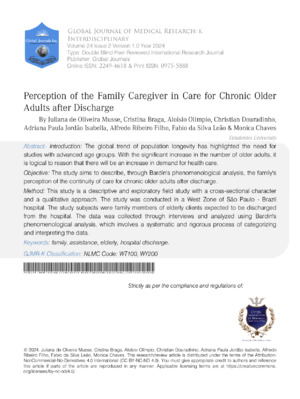Perception of the Family Caregiver in Care for Chronic Older Adults after Discharge
Keywords:
family, assistance, elderly, hospital discharge
Abstract
Introduction The global trend of population longevity has highlighted the need for studies with advanced age groups With the significant increase in the number of older adults it is logical to reason that there will be an increase in demand for health care Objective The study aims to describe through Bardin s phenomenological analysis the family s perception of the continuity of care for chronic older adults after discharge Method This study is a descriptive and exploratory field study with a cross-sectional character and a qualitative approach The study was conducted in a West Zone of S o Paulo - Brazil hospital The study subjects were family members of elderly clients expected to be discharged from the hospital The data was collected through interviews and analyzed using Bardin s phenomenological analysis which involves a systematic and rigorous process of categorizing and interpreting the data Results During the analysis it was possible to identify through the subjects responses the daunting task of caring for chronically ill older adults which is still carried out predominantly by women with some degree of direct kinship with the older adult The reality of chronic illness changes the family structure presenting numerous challenges that often go unnoticed However the socioeconomic condition of most of the Brazilian population does not allow family members to benefit from a health professional who meets the elderly s care needs Discussion Often insecurity regarding the care provided as well as the lack of knowledge about the pathology and its implications can make caring for this older adulta tough challenge for both the family and the healthcare professional accompanying them The caregiver s well-being a crucial factor directly affects the quality of care for older people Final Considerations A family member who is well-oriented healthy and well-supported will guarantee engagement in self-care adhering to the therapeutic and preventive scheme so that they reach the best level of health and consequently the best possible quality of life
Downloads
How to Cite
References

Published
2024-07-10
Issue
Section
License
Copyright (c) 2024 Authors and Global Journals Private Limited

This work is licensed under a Creative Commons Attribution 4.0 International License.